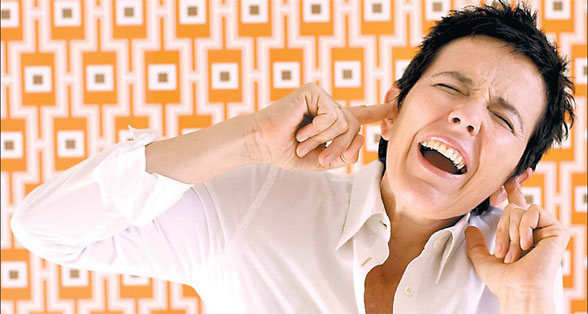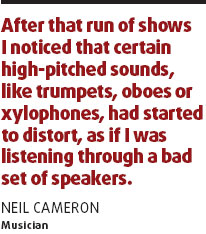Music roared and slowly I went deaf

The audiologist didn't mince her words. "You've got the hearing of someone 30 years older than you." The results on the audiogram showed that I have "severe" hearing loss with high-frequency sounds, she says. It's not what a 44-year-old expects or wants to hear.
It wasn't a surprise, though. I've struggled for many years to hear clearly in almost every situation: at work, in bars or restaurants, at parties, in front of the TV, at the cinema, or on the mobile. Partial deafness is very frustrating. It's also usually irreversible. Unlike most parts of the body, damaged inner ear hair cells don't regenerate.
I've lost count of the number of times I've missed out on hearing a joke, gossip or discussion of a film. But for many years a reluctance to wear hearing aids meant I did nothing.
But as of 10 days ago I am no longer one of what the UK's Royal National Institute for Deaf People (RNID) says is the four million Britons who could benefit from wearing a hearing aid but don't, and am now among the two million who do.
Nanotechnology and modern design mean my silver Sonic Ion hearing aids are probably less noticeable than a Bluetooth. Hardly anyone has spotted them. A see-through plastic tube connects the oblong microphone-cum-processor-cum-amplifier behind my ears to the tiny tubing that sends the sounds down into each of my ear canals.
My hearing hasn't become perfect overnight, but I am hearing an awful lot more, and hearing it more clearly. Sounds that were dull are now sharp. Running water in a sink can sound positively cacophonous.
I already feel much more confident in social situations. I'm relishing attending a friend's book launch. Usually such gatherings involve missing much of the chatter or having to ask someone to repeat something; or, worst of all, leaning so close to someone in order to hear them properly that they think you're some sort of stalker. It's great not having to keep saying: "Sorry, I missed that - I'm a bit hard of hearing. Could you repeat that?"
The likeliest reason I'm a bit deaf is the first love of my life: music. Between 1979 and 1985 I drummed in bands, and regularly went to gigs and clubs until the early 1990s.
The three audiologists I have seen all described how they are now seeing DJs, musicians, factory workers, road diggers, and people who shoot - with hearing loss well before their time.
Now that people spend more time in louder bars, at all-night clubbing, with MP3 players or at music festivals, more of them are hearing more loud music more often and for longer than ever before.
Noise-related hearing damage is not new, but the 1960s brought the creation of deliberately loud music as entertainment. From the Who to Deep Purple, through to Motorhead and more recent bands such as My Bloody Valentine and Mogwai, to many who play and appreciate music, loud is good and louder is better still.
Our inner ear hair cells pick up the mechanical energy of sound, convert it into electrical signals and transmit it to the brain. When we're born, each of us has about 30,000 such cells, and this number decreases slowly after the age of 25. But prolonged exposure to noise makes cells less sensitive. And once they're gone, they don't come back.
A survey in 2006 by Deafness Research UK concluded that today's youth are at risk of going deaf up to 30 years earlier than their parents because they are listening to MP3 players too loudly and too often. They blamed the fact that a large percentage of them now own a personal music player and sophisticated sound systems in their car and homes, which allow them to blast out music day and night.
The survey also found that people generally spend more time in clubs where the noise is so loud we can barely hear the person opposite. And, few people, particularly in the 16- to 34-year-old age group, are aware of the damaging effect all this can have on their hearing.

Neil Cameron, 44, has been a musician for 22 years. He has had tinnitus, or ringing in the ears, for several years. Recently, after playing double bass almost every night for several weeks with an orchestra, and standing next to some loud trumpet playing, it suddenly worsened.
Recently he began wearing earplugs to prevent any further damage. As a musician he needs to do all he can to protect his hearing, and his livelihood. The earplugs, though, won't lessen or reverse his tinnitus.
"It can keep me awake at night, sometimes for hours. It's irritating. I hear anything from one ringing sound to three or four at the same time, all of different pitches," he says. "After that run of shows I noticed that certain high-pitched sounds, like trumpets, oboes or xylophones, had started to distort, as if I was listening through a bad set of speakers."
Cameron has been helped by the Musicians Union, which points out that either sustained exposure to excessive noise levels, or just a short burst of loud noise, can damage those vital inner ear hair cells.
Pete Townshend, the guitarist with the Who, has blamed studio headphones for his hearing loss, but also pinpointed the band's appearance on an American TV show in the late 1960s, when drummer Keith Moon unexpectedly set off a small explosion just beside him, as the start of his problems.
The UK's Health and Safety Executive warns that hearing can be damaged irreversibly by exposure to any noise above the recommended 80 decibel limit, and especially if it's anything over 105dB for more than 15 minutes. But clubs, gigs and festivals often top 110 decibels. When the RNID monitored a Justin Timberlake show in London's Docklands last year they recorded a high of 121 decibels.
Embarrassment, denial of the problem and the stigma around hearing loss all lead people with problems to cover up or fail to seek help. The average length of time someone with hearing loss waits before seeking advice is 15 years. That's an awful lot of unnecessary suffering.
The Guardian
(China Daily 06/11/2008 page19)














